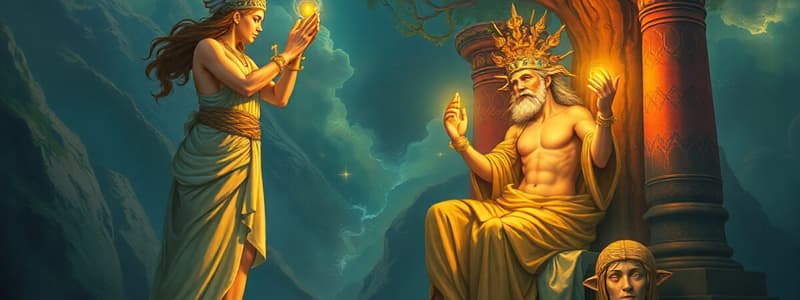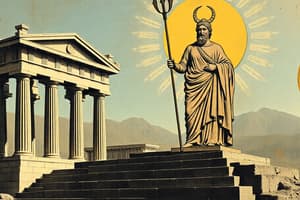Podcast
Questions and Answers
Who was the son of Apollo and a mortal woman known for his healing abilities?
Who was the son of Apollo and a mortal woman known for his healing abilities?
- Asclepius (correct)
- Iaso
- Amphiaraus
- Hygeia
The Asclepeions were located exclusively within urban areas.
The Asclepeions were located exclusively within urban areas.
False (B)
Name one of the children of Asclepius.
Name one of the children of Asclepius.
Hygeia
Asclepius was known for using ____ to treat patients, including divine surgery and prescribed diets.
Asclepius was known for using ____ to treat patients, including divine surgery and prescribed diets.
What was the primary purpose of the Asclepeions?
What was the primary purpose of the Asclepeions?
Match the following figures with their respective roles:
Match the following figures with their respective roles:
Miracles were documented in votive inscriptions chiefly to show gratitude for recovery.
Miracles were documented in votive inscriptions chiefly to show gratitude for recovery.
What was the significance of the amphiareion at Oropos?
What was the significance of the amphiareion at Oropos?
Which of the following best describes the Oracle at Dodona?
Which of the following best describes the Oracle at Dodona?
The Eleusinian Mysteries were exclusive to Greek men only.
The Eleusinian Mysteries were exclusive to Greek men only.
What was the role of the Hierophant in the Eleusinian Mysteries?
What was the role of the Hierophant in the Eleusinian Mysteries?
The sacred brew used during the Eleusinian Mysteries was called _____ and contained barley and pennyroyal.
The sacred brew used during the Eleusinian Mysteries was called _____ and contained barley and pennyroyal.
Match the following key terms with their definitions:
Match the following key terms with their definitions:
Which type of questions were commonly asked at Dodona?
Which type of questions were commonly asked at Dodona?
Alcibiades was punished with death for mocking the Eleusinian Mysteries.
Alcibiades was punished with death for mocking the Eleusinian Mysteries.
What natural element was believed to provide divine messages at Dodona?
What natural element was believed to provide divine messages at Dodona?
The Eleusinian Mysteries were linked to the myth of Demeter and her daughter _____ being abducted.
The Eleusinian Mysteries were linked to the myth of Demeter and her daughter _____ being abducted.
Match the following elements of the Eleusinian Mysteries with their description:
Match the following elements of the Eleusinian Mysteries with their description:
What were the consequences for revealing the secrets of the Eleusinian Mysteries?
What were the consequences for revealing the secrets of the Eleusinian Mysteries?
The Eleusinian Mysteries continued to be significant even during political crises.
The Eleusinian Mysteries continued to be significant even during political crises.
What was the primary purpose of initiating participants into the Eleusinian Mysteries?
What was the primary purpose of initiating participants into the Eleusinian Mysteries?
Herodotus’ account mentions the kidnapping of two priestesses from __________, which led to the founding of Dodona.
Herodotus’ account mentions the kidnapping of two priestesses from __________, which led to the founding of Dodona.
Flashcards
Who was Asclepius?
Who was Asclepius?
The ancient Greek god of healing, son of Apollo and a mortal woman, revered for his ability to cure illnesses and restore health.
What is an Asclepeion?
What is an Asclepeion?
A major healing sanctuary dedicated to Asclepius, often located outside cities for a cleaner environment. These sanctuaries functioned as centers for medical practice and spiritual healing.
Describe the process of visiting an Asclepeion.
Describe the process of visiting an Asclepeion.
A process involving three days of purification, offerings to Asclepius and Apollo, and incubation (sleeping in the sanctuary) to receive healing in dreams.
What is a votive relief from Melos?
What is a votive relief from Melos?
Signup and view all the flashcards
What are miracles in the Asclepian cult?
What are miracles in the Asclepian cult?
Signup and view all the flashcards
What is the Amphiareion at Oropos?
What is the Amphiareion at Oropos?
Signup and view all the flashcards
Who is Hygeia?
Who is Hygeia?
Signup and view all the flashcards
Who is Panacea?
Who is Panacea?
Signup and view all the flashcards
Incubation
Incubation
Signup and view all the flashcards
Asclepeion
Asclepeion
Signup and view all the flashcards
Oracle
Oracle
Signup and view all the flashcards
Amphiareion
Amphiareion
Signup and view all the flashcards
Votive Offering
Votive Offering
Signup and view all the flashcards
Dodona
Dodona
Signup and view all the flashcards
Mystery Cults
Mystery Cults
Signup and view all the flashcards
Eleusinian Mysteries
Eleusinian Mysteries
Signup and view all the flashcards
Epoteia
Epoteia
Signup and view all the flashcards
Hierophant
Hierophant
Signup and view all the flashcards
Initiation
Initiation
Signup and view all the flashcards
Kykeon
Kykeon
Signup and view all the flashcards
Myst
Myst
Signup and view all the flashcards
Mystagogue
Mystagogue
Signup and view all the flashcards
Significance of the Eleusinian Mysteries
Significance of the Eleusinian Mysteries
Signup and view all the flashcards
Study Notes
The Healing Cult of Asclepius
- Asclepius was a Greek hero, son of Apollo and a mortal woman, who healed Greek warriors.
- After his death, he became a god of healing, worshipped through the Asclepius cult.
- Key figures in the cult included Hygeia (goddess of health), Panacea (goddess of cures), Iaso (goddess of cures), and Aigle (goddess of radiant health).
- Asclepius' cult gained popularity due to limited medical knowledge, with worship expanding rapidly during epidemics.
- Major sanctuaries (Asclepeions) included Epidaurus (pilgrims seeking cures), and Kos (medical school).
- Asclepeions combined worship with practical cures, attracting devotees from across Greece, outside urban areas for cleaner environments, and with a focus on fresh air (Athens' Asclepieion was on the Acropolis' southern slope).
Visiting an Asclepeion
- The visit involved a procession, 3-day purification (bathing, cleansing, purging), offerings (to Apollo and Asclepius), and prayers, followed by incubation.
- Incubation involved sleeping in a sanctuary stoa/abaton, focusing on dreams, divine intervention (divine surgery), and prescribed diets/exercises for healing.
- Worshippers expressed gratitude through cures, thanks, and votive offerings.
Votive Relief from Melos
- A 1st century AD marble relief offering to Asclepius and Hygeia for healing a leg wound.
- Showed a reciprocal relationship – offerings for divine assistance.
- Its expense emphasized profound gratitude.
Miracles
- Miracle accounts in votive inscriptions legitimized cults, including Ambrosia's cure from blindness and Cleo's pregnancy solution.
Amphiareion at Oropos
- A sanctuary dedicated to Amphiaraus near Athens, combining rational (diet) and supernatural approaches (divine interventions).
- Followers slept on ram skins, experiencing healing via minor surgery or herbal remedies, and the linking of healing with clean environments aligning with Hippocrates' teachings.
Oracles and Dodona
- An oracle could be the site, person, or the message itself, providng divine guidance and answers.
- Dodona, the oldest Greek oracle dedicated to Zeus Naios and Dione in Epirus, gave responses using rustling oak leaves or doves.
- Herodotus suggested that Dodona's founding involved kidnapped Egyptian priestesses, interpreted by locals as bird sounds.
- Questions inscribed on lead tablets (over 4,000 found) covered personal (health, relationships) and social (migration) issues, receiving simple yes/no answers or advice.
Overview of Mystery Cults
- Exclusively religious groups with secretive rites, derived from "mystes" (initiated), involving initiation ceremonies with vows of secrecy.
- The Eleusinian Mysteries were the most famous.
Key Features of the Eleusinian Mysteries
- Incorporated into Athenian civic religion by the late 6th century BC.
- Open to all Greeks and non-Greeks, of any gender or status.
- Entrance requirements included speaking Greek, no serious prior crimes, and a contribution for initiation.
- Strict secrecy dictated severe punishment for revealing secrets.
Historical and Mythical Background of the Eleusinian Mysteries
- Associated with the Homeric Hymn to Demeter, portraying the abduction of Persephone by Hades and Demeter’s mourning, explaining the seasons (spring/summer - Persephone on Earth, autumn/winter – Persephone in the Underworld).
Archaeological Evidence of the Eleusinian Mysteries
- Early buildings date back to the Geometric Period.
- Telesterion was the central hall expanded under Pericles in the 5th century BC.
- The Mirthless Rock was a sacred spot of Demeter’s observation of initiates.
Initiation Ceremony
- Included preparation rituals (cleansing, fasting).
- Stages involved sacrifices, procession to Eleusinian Gulf (bathing), and the Kykeon (sacred brew).
- The ceremony re-enacted Demeter’s search (torches).
- A transformative, symbolic death and rebirth, culminating in the Epoteia (revelation of the cult’s secret).
Ninnion Tablet
- A 400-300 BC tablet depicting initiates led by Iacchus to Demeter and Persephone with torches.
- Illustrates the inclusivity of the cult, showing men and women together. Persephone holds a libation vessel, while Iacchus leads the procession with musicians.
Significance of the Eleusinian Mysteries
- Promoted spiritual transformation, community, and afterlife beliefs.
- Remained important during times of political crisis (e.g., Persian invasion).
Studying That Suits You
Use AI to generate personalized quizzes and flashcards to suit your learning preferences.




